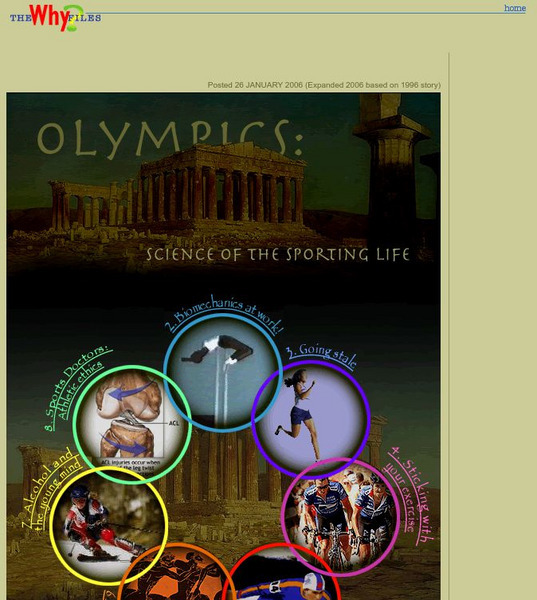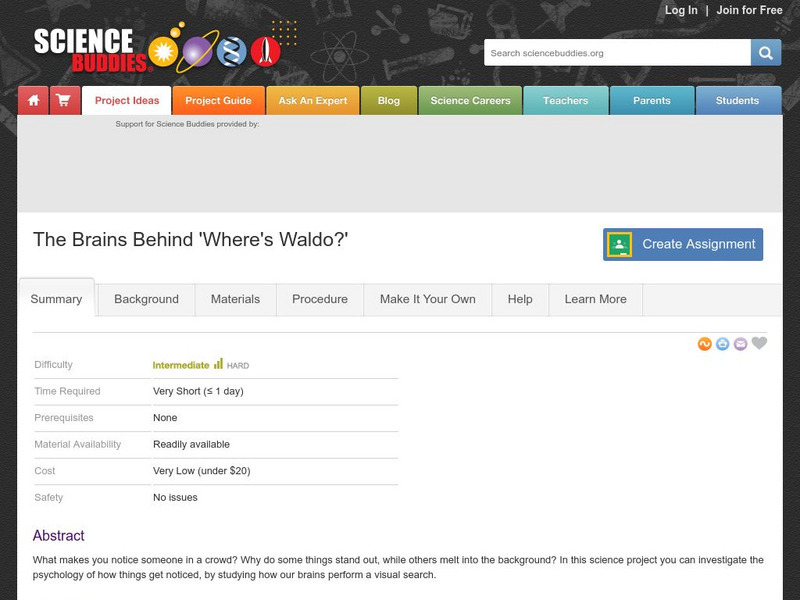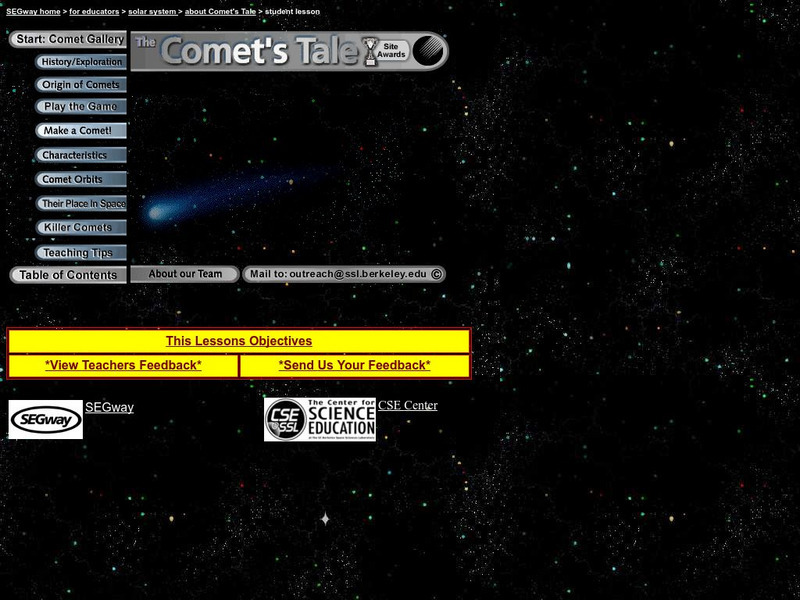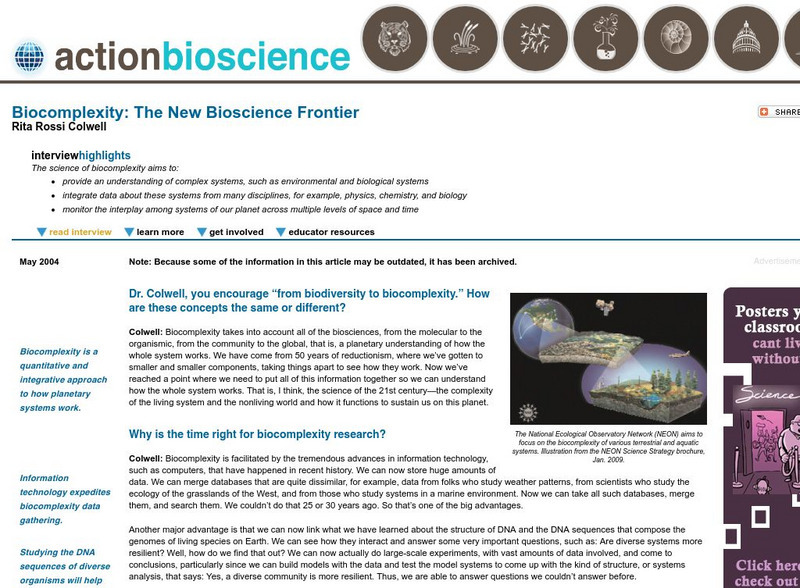University of Wisconsin
The Why Files: Olympics: Science of the Sporting Life
When the Winter Olympics begin we can study the science of sports: biomechanics, figure skating, high jumping, mental preparation, alcohol and athletes, sports doctors, staleness, and training in the ancient Olympics.
University of Wisconsin
The Why Files: The Science Behind the News: Secrets of the Mummy
This article discusses the study of oxygen isotopes in the teeth of Oetzi, the 5,200 year mummy found in the Tyrolean Alps, as a way of identifying where the man had probably lived. Includes map of location of the body upon death.
NASA
Nasa: 21th Century Explorer: Why Do We Want to Study and Travel to Mars?
This article answers some of the most common questions about Mars: Why is it red? Is there water on Mars? What else have scientists discovered from spacecraft that have landed there? Also, visitors can follow links to learn more about...
Untamed Science
Untamed Science: Ecology: The Study of Interactions
Learn about how ecology is simply the study of how and why organisms interact with their environments.
Other
The Plant Cell: Teaching Tools in Plant Biology: Why Study Plants?
Plants are essential for all life and development. Teach your students about this incredible lifeforce with this teaching guide, lecture notes, and PowerPoint presentation. [PDF]
Open Curriculum
Open Curriculum: Studying the History of Life
This in-depth article illustrates the concept of geologic time, and helps the learner understand why fossils are rare.
Science Buddies
Science Buddies: Fractography: The Way Things Break
When something goes wrong, do you like to try to figure out why? Engineers do this all the time. They even have a fancy name for it: failure analysis. Understanding how different materials break is an important part of failure analysis....
Science Buddies
Science Buddies: The Brains Behind 'Where's Waldo?'
What makes you notice someone in a crowd? Why do some things stand out, while others melt into the background? In this experiment you can investigate the psychology of how things get noticed, by studying how our brains perform a visual...
University of California
Univ. Of Cal Berkeley: The Comet's Tale
Site provides extensive information in the study of comets. Includes excellent graphics that depict what comets look like as they travel through the solar system. Also includes information on how comets may have effected the Earth's...
University of Wisconsin
The Why Files: Sputnik's Legacy
This exploratory article (published September 11, 1997) outlines the history of the Sputnik Space program, but also includes the response within the United States educational system to speedily ramp up the study of science, math and...
Society for Science and the Public
Science News for Students: Bad for Breathing
A study provides new clues as to why some respiratory diseases are linked to air pollution.
Other
Rutgers Marine & Coastal Sciences: Cool Classroom
Students and teachers can explore the work of marine scientists and observe the ocean from their computers. Learn about Rutgers Coastal Ocean Observation Laboratory, discover why oceanography is important, and see what life is like in...
Khan Academy
Khan Academy: Vaccines and the Autism Myth Part Ii
An explanation of how the Wakefield study was fabricated and why the study has no link to autism.
Science Struck
Science Struck: The Reasons Why Geography Is So Important
Explains reasons why the study of geography is beneficial.
Georgia Department of Education
Ga Virtual Learning: Epidemiology, Public Health, and You
Activities in this comprehensive interactive tutorial will help you explore various public health careers. In addition, you will learn about why ethical guidelines are necessary in epidemiological research; emerging and past public...
Ducksters
Ducksters: Earth Science for Kids: Tsunamis
Investigate tsunamis including what causes them such as earthquakes, where they occur, why they are dangerous, and what happens during a tsunami event on this website.
Other
Nicky Case: The Wisdom And/or Madness of Crowds
Why do some crowds turn to madness and other crowds turn to wisdom? Network science seeks to explain groupthink with its core idea being we should not study the individual people, but their connections. Use this interactive site to...
Curated OER
National Park Service: Fossils in Time Unit
For this lesson, students learn about the earth's past by studying clues that have been left behind, such as fossils and rocks. Students will find the answers to many questions: What is paleontology?, What is geological time?, What can...
Open Curriculum
Open Curriculum: Classification: Form and Function
Find out about taxonomy, and understand why scientists classify organisms. Study the concepts behind Linnaean taxonomy and binomial nomenclature.
TeachEngineering
Teach Engineering: Mission to Mars
The Mission to Mars curricular unit introduces students to Mars-the Red Planet. Students discover why scientists are so interested in studying this mysterious planet. Many interesting facts about Mars are revealed, and the history of...
American Institute of Biological Sciences
Action Bioscience: Biocomplexity: The New Bioscience Frontier
Embrace biocomplexity as a newer concept in science. Discover why it might be important to merge data from very diverse studies and analyze them.
Exploratorium
Exploratorium: Earthquake Faultline Earthquake Activities
This outstanding website provides an excellent variety of hands-on earthquake activities to help you understand what causes earthquakes.


















